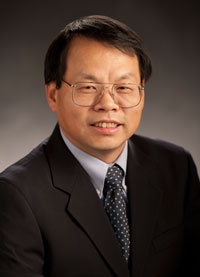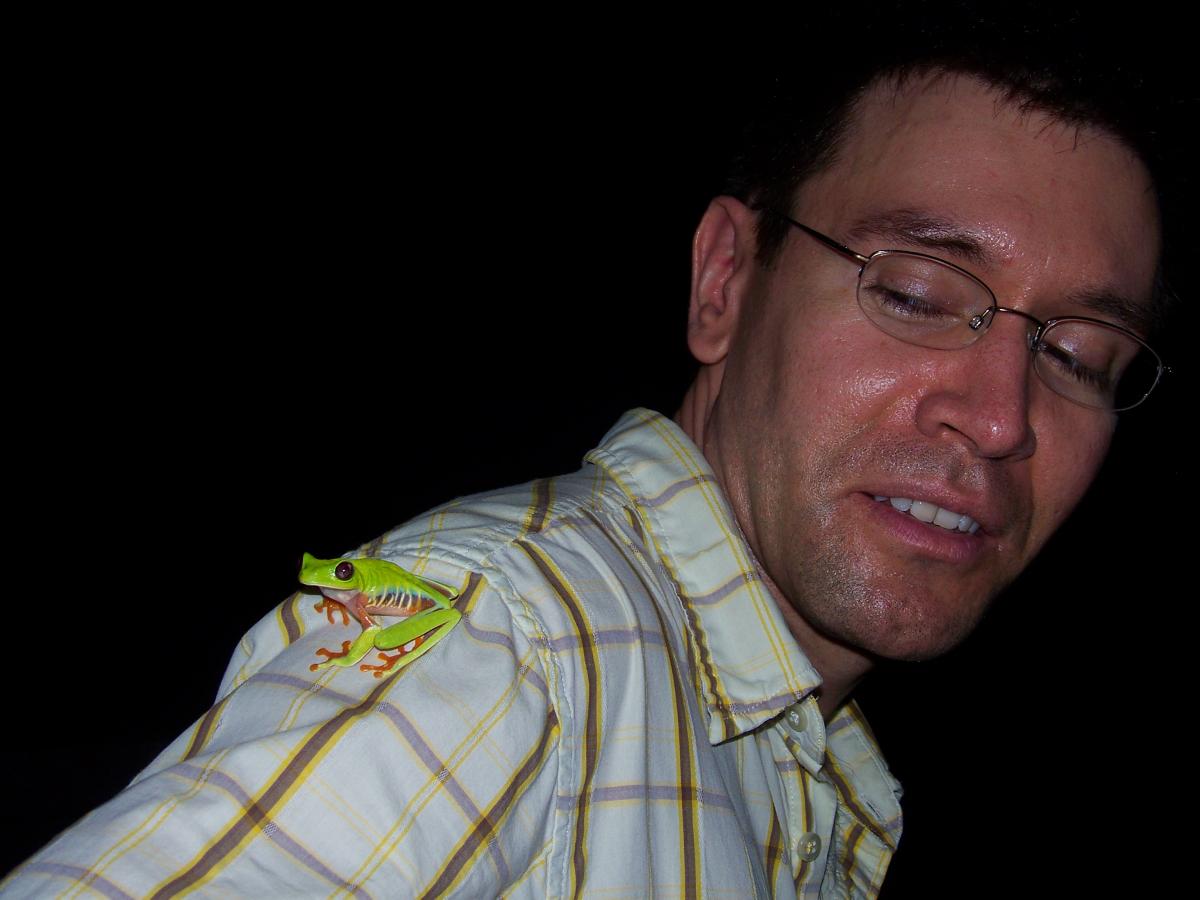CHANS-Net Newsletter -- January 2012
Jan. 9, 2012
Table of Contents
- Welcome from PI Jianguo "Jack" Liu
- 2012 AGU Fall Meeting site of next CHANS event
- Enhance your career as a CHANS Fellow
- Group tackles challenges of CHANS research in higher education
- Put more net in CHANS-Net
- Two special issues on CHANS research upcoming
- GLOBE Project receives NSF funding
- National Science Foundation grants awarded for research on coupled natural and human systems
- Photo from the Field
- Upcoming events
Welcome from PI Jianguo “Jack” Liu
 Welcome to our new format for the CHANS-Net newsletter. CHANS-Net has grown considerably since we last communicated with you, and we’ve added new features and capabilities to our redesigned website. If you’re a new reader, let us introduce ourselves: CHANS-Net, sponsored by the National Science Foundation, facilitates communication and collaboration among scholars from around the world who are interested in the study of coupled human and natural systems.
Welcome to our new format for the CHANS-Net newsletter. CHANS-Net has grown considerably since we last communicated with you, and we’ve added new features and capabilities to our redesigned website. If you’re a new reader, let us introduce ourselves: CHANS-Net, sponsored by the National Science Foundation, facilitates communication and collaboration among scholars from around the world who are interested in the study of coupled human and natural systems.
Exciting progress has been made since the six CHANS-Net symposia held at the American Association for the Advancement of Science annual meeting in Washington, D.C., in February 2011. For example, two special issues in Ecological Modelling based on the symposia are in the works.
Also of note in this issue:
- Plan to participate in the CHANS-Net events at the American Geophysical Union’s fall meeting on Dec. 3-7, 2012.
- Information on CHANS Fellowships – please pass along to junior faculty (assistant professors), junior researchers, postdoctoral associates and graduate students.
We’ll look forward to seeing you at the CHANS-Net events in December 2012 if not sooner.
2012 AGU Fall Meeting site of next CHANS event
‘Tis the season to plan: Organization is underway for the 2012 CHANS-Net event at the Fall Meeting of the American Geophysical Union next December in San Francisco. It’s shaping up as an opportunity for established scholars and rising stars to share results and stories of coupled human and natural systems research.
All CHANS researchers are welcome to attend the event. This event also will serve as a PI meeting for the National Science Foundation's Dynamics of Coupled Natural and Human Systems (CNH) Program. Junior scholars (graduate students, post-doctoral fellows and junior faculty members) conducting CHANS research can apply for a CHANS Fellowship to help defray the costs of participating in the AGU meeting.
The AGU 2012 Fall Meeting is Dec. 3-7 -- mark your calendars now!
Abstracts will be due in late spring 2012. The CHANS-Net website will feature updates on sessions and presenters as the meeting approaches.
Enhance your career as a CHANS Fellow
Junior scholars studying the relationships between human and natural systems are welcome to apply to the CHANS Fellow program; the call for applications will be announced soon.
With support from the National Science Foundation, CHANS-Net offers CHANS Fellowships each year. The CHANS Fellows present posters or give talks at a professional national meeting and have opportunities to interact with prominent CHANS scientists to learn the latest research developments and build professional networks.
Approximately 10 fellowships (up to $1,000 each) will be awarded to the selected graduate students, postdoctoral associates, junior faculty members and/or other junior researchers at other institutions around the world to defray expenses associated with attending the meeting. Applications are judged on the merit of the applicants' abstracts, financial need, and professional backgrounds and goals. Members of under-represented groups are especially encouraged to apply.
Applicants for 2012 Fellowships will be asked to submit abstracts of research that will be presented at the 2012 Fall Meeting of the American Geophysical Union, Dec. 3-7 in San Francisco, Calif. Special consideration will be given to proposals for CHANS synthesis, either by system type (agricultural, urban, etc.) or by some aspect of complexity (feedback, time lags, etc.).
To be added to the call for applications e-mail list, send an e-mail to chans-net@csis.msu.edu with a subject line of “2012 CHANS Fellowship.” Interested scholars also can bookmark the CHANS-Net Opportunities web page where the announcement will be listed.
More information on the CHANS Fellowship Program.
Group tackles challenges of CHANS research in higher education
Meshing the natural sciences with social sciences to tackle some of the world’s most pressing environmental issues often flies in the face of business-as-usual for universities.
Yet the approach of coupled human and natural systems (CHANS) – holistically seeking to understand both the human systems and natural systems – offers promise of better understanding and greater impact on problems.
At the kick-off event of CHANS-Net, a symposium on Complexity in Human-Nature Interactions across Landscapes and a companion workshop on "Challenges and Opportunities in Research on Complexity of Cooupled Human and Natural Systems" brought together leading CHANS scientists at the 2009 meeting of the U.S. Regional Association of the International Association for Landscape Ecology in Snowbird, Utah.
A recent Bulletin of the Ecological Society of America features a summary based on discussions among CHANS scientists in Snowbird entitled “Research on Coupled Human and Natural Systems (CHANS): Approach, Challenges, and Strategies.” Authors are Bill McConnell, James D.A. Millington, Nicholas J. Reo, Marina Alberti, Heidi Asbjornsen, Lawrence A. Baker, Nicholas Brozović, Laurie E. Drinkwater, Scott A. Drzyzga, José Fragoso, Daniel S. Holland, Claire A. Jantz, Timothy A. Kohler, Herbert D.G. Maschner, Michael Monticino, Guillermo Podestá, Robert Gilmore Pontius, Jr., Charles L. Redman, David Sailor, Gerald Urquhart, and Jianguo “Jack” Liu.
Put more net in CHANS-Net
Having CHANS-Net be the most visited and resource-rich site on coupled human and natural systems research strengthens each member’s influence, reach and voice. Weave that net:
- Submit news items.
- Update your profile.
- Enter and update your publications.
- Send us the link to your blog so we can feature it.
- Forward this newsletter to interested colleagues and students.
If you need help updating your profile or entering publications, contact Jamie DePolo, CHANS-Net communications manager, at depolo@msu.edu.
Two special issues on CHANS research upcoming
Two special issues in the international journal Ecological Modelling are in the works to take the ongoing conversation and evolution of CHANS research forward.
At the American Association for the Advancement of Science Annual Meeting in Washington, DC, in February 2011, six symposia were dedicated to exploring exciting and innovative ways to better understand the intricate connections between natural and human systems. Some 30 scientists weighed in with presentations, often to standing-room-only audiences.
Now Li An of San Diego State University and David López-Carr of the University of California, Santa Barbara, are putting the finishing touches on a special issue of Ecological Modelling, based on the symposium “Mapping and disentangling human decisions in complex human-nature systems” they organized with Janet Silbernagel of the University of Wisconsin, Madison.
The issue will carry 10 papers addressing crucial aspects of human decision-making in complex CHANS. These papers explore which human decisions are modeled; which predictors may explain such decisions or pre-decision precursors; what goals can be achieved; what organizational units are employed; what spatial scales are considered; and what analytical or modeling approaches are used.
Also in the works is another set of contributions to Ecological Modelling organized by Tim Kohler and Stefani Crabtree of Washington State University that will include papers based on presentations in their CHANS symposium from the AAAS 2011 meeting “Modeling across millennia: interdisciplinary paths to ancient socionatural systems.”
GLOBE Project receives NSF funding
Scientists studying land change will have another opportunity to collaborate on local and regional observations through the Global Collaboration Engine (GLOBE) Project, led by Erle Ellis of the University of Maryland, Baltimore County, and conducted in collaboration with CHANS-Net and the Global Land Project.
CHANS-Net members can help select case studies for assimilation into GLOBE. For more information about the project and opportunities for graduate student and post-doctoral positions, contact Ellis at ece@umbc.edu. The GLOBE Project has a website.
The GLOBE Project was funded by the National Science Foundation Cyber-Enabled Discovery and Innovation Program.
National Science Foundation grants awarded for research on coupled natural and human systems
NSF’s CNH program has awarded $21 million in grants to scientists, engineers and educators across the country to study coupled natural and human systems.
"This year's CNH awards highlight the need for scientists from different fields to work together and benefit from each other's perspectives to gain an understanding of the complex ways people interact with Earth's natural systems," says Tom Baerwald, CNH program director.
To read more about all the funded projects, visit the 2012 CNH news page.
Photo from the Field
 CHANS-Net member Bill Burnside gets up close and personal with a frog on Barro Colorado Island in Panama. Burnside, doctoral student in biology at the University of New Mexico and 2011 CHANS Fellow, was on the island studying the geometry of leaf-cutter ant foraging trail networks.
CHANS-Net member Bill Burnside gets up close and personal with a frog on Barro Colorado Island in Panama. Burnside, doctoral student in biology at the University of New Mexico and 2011 CHANS Fellow, was on the island studying the geometry of leaf-cutter ant foraging trail networks.
Burnside says:
“In my leaf-cutter ant research in Panama, I was studying the geometry of leaf-cutter ant foraging trail networks to see if they conformed with predictions from metabolic theory. In essence, those predictions boil down to the networks having fractal-like structure, branching in similar fashion at all levels of the network. Such “self-similar” geometry is common to vascular networks in animal bodies and to distribution networks in human societies. As branches are added to these networks to service larger bodies and larger societies, fuels and wastes must travel further. As a result, the rate of energy use by cells in bodies and individuals in economies rises more and more slowly with increasing body size and economy size. This tendency has implications for resource use by human societies (CHANS) as the world urbanizes and attempts to expand economically.”
Burnside’s most recent paper, “Human macroecology: linking pattern and process in big-picture human ecology,” was published in July 2011 in Biological Reviews.
Upcoming events
Planet Under Pressure 2012
March 26-29, 2012
CHANS-Net members are heavily involved in this event. Advisory board member Elinor Ostrom will give the opening plenary presentation on the state of the planet and member Eric Lambin is leading the session entitled "Telecoupling and land change in emerging economies: Trade and the rise of eco-consumerism."
U.S. Regional Association of the International Association for Landscape Ecology US-IALE 2012 Annual Symposium
April 8-12, 2012
Symposium: "Disentangling Diverse Drivers and Complex Dynamics of Coupled Human and Natural Systems (CHANS)"
American Geophysical Union Fall Meeting
Dec. 3-7, 2012
CHANS-Net events (and PI meeting of NSF CNH Program)






